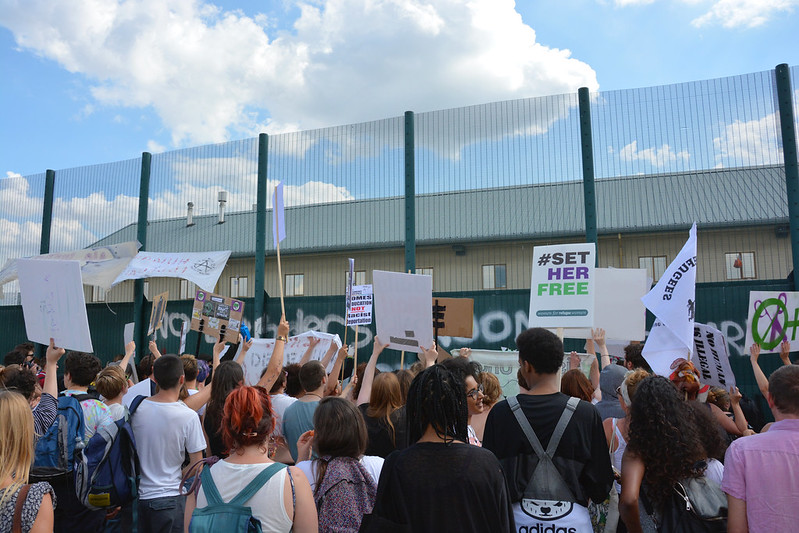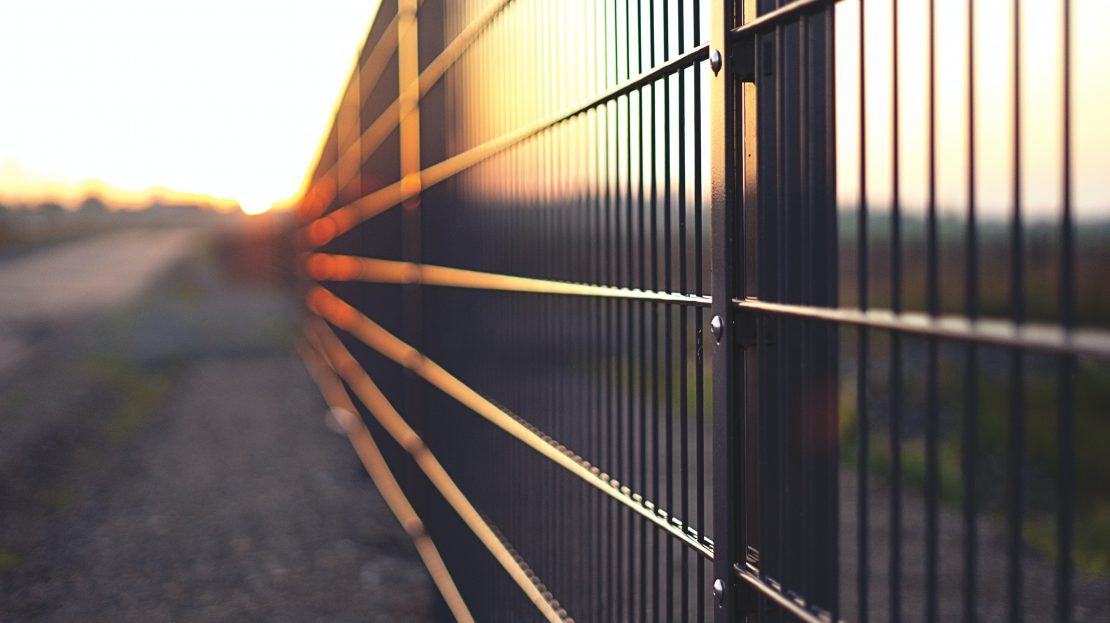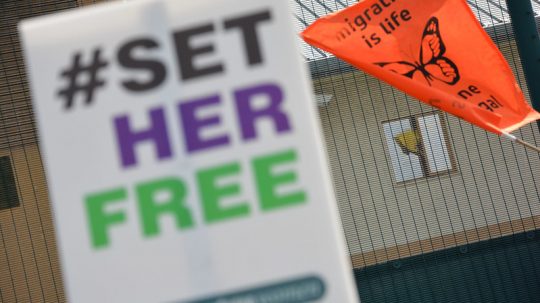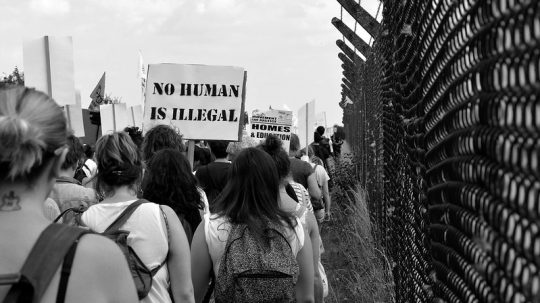Currently, thousands of people seeking asylum are detained in immigration centres across the UK. With concerns around conditions, recent attacks and reports of deteriorating mental health of the people held inside, campaigners are calling on the Home Office to take alternatives to immigration detention seriously.
Following two recent pilot schemes exploring alternatives to immigration detention, the government has announced plans to open more detention centres and mass ‘accommodation centres’.
Mishka, a campaigns consultant for Detention Action, spoke to us about why the starting point to build a fairer asylum system is to take alternatives seriously.
There has to be better alternatives
Alternatives to immigration detention can include case management services and community-based programs which provide a holistic set of services, including access to legal aid and guidance.
Mishka said: “There’s no specific definition when it comes to alternatives to detention . But in simple words, here, we are talking about any legislation, policy or practice, or strategy that ensures people are not detained for reasons relating to their migration status and ensuring human dignity and human rights.”
He continued: “When we are talking about alternatives, we are talking about human rights. [A system] centred on protecting the rights of people who migrate and people navigating the asylum system, and proper engagement rather than enforcement. It includes holistic support, not restricting of people’s liberty, access to legal services and support and access to health services. Alternatives would mean that people would be living in the community rather than in detention or in other forms of institutional settings.”
Human Rights Watch found that alternatives to detention such as case management services can effectively address government interests in immigration enforcement while protecting migrants’ rights and offering a range of other benefits.
“There were two pilot projects funded by the Home Office. Both of these pilots have ended now and I think the Home Office has to focus a lot on investing, as well as expanding such alternatives to detention models. We keep talking about pilots, but we need to move away from pilots now, we need them for real,” said Mishka.
Backlogs are leaving people’s lives on hold
Mishka said: “From figures I have seen, at the end of March this year, the data showed that there was a backlog of over 90,000 cases pending or awaiting initial decision on their asylum claims made since 2006. Here we are talking about people’s life on hold. People are stuck in a legal limbo.”
Often, when we speak about human rights and immigration detention, the right to liberty and security is the first that comes to mind – however, there are multiple rights that immigration detention can infringe. Article 8, the right to a private and family life, is one that has been referenced in some deportation cases.
Article 8 is an ‘essential’ right and is often used as a last resort. Mishka explained: “The right to family and private life is one of the protections that people can call on if they are subjected to deportation in the UK.”
“It’s not uncommon for individuals to face deportation despite having lived in the UK for most of their lives, meaning that their entire community and family is here.
“We are talking about people who have been living in the UK since they were really young and they have strong family ties, they have children, they have communities. The harsh reality of deportation means that often the only avenue they have to challenge their deportation is though article 8.”
Detention is an unnecessary provision against liberty
There have been concerns from NGOs and medical professionals about the mental health of those held in immigration detention, including the British Medical Association (BMA).
While the BMA is supportive of immigration detention being ‘phased out’, the union has said that while it exists, “There should be a clear limit on the length of time people can be held in detention, and detainees’ healthcare rights should not be infringed.”
Mishka said: “There’s going to be ongoing mental health issues for people impacted by detention. And this can take some time to overcome: for some people, it can take much longer, maybe two years, three years or maybe never. I think detention is an unnecessary provision against people’s liberty. It’s cruel and it’s inhumane. So, the starting point is there has to be better alternatives. And there are better alternatives, we can do much better than this.”
A person who is being held in Immigration Detention told the charity Bail for Immigrantion Detainees: “[I am] depressed, [and experiencing] anxiety though [no one] is caring what is going on. I have lived in the UK since four, over 30 years.”
Refugees are being used as footballs by politicians to score political points
Currently, people seeking asylum in the UK face multiple barriers, including immigration detention, not having the right to work and backlash from local authorities. However, one of the main difficulties campaigners have reported facing is the politicisation of refugees.
Mishka stated: “One of the biggest barriers, for me, is the current politicisation of refugees and people seeking safety in the UK. In my view, basically, what we constantly see is people fleeing war, torture and other forms of extreme human rights violations are being used as a political football to score political points.”
Speaking about developments in the last year Mishka explained how a hostile environment is being cultivated through legislation. He stated: “We see quite harsh parliamentary acts such as the Nationality and Borders Act and the Rwanda policy. Refugees are being used as footballs by politicians to score political points. These are not only barriers but they are direct threats to refugees.”
Mishka said: “The reality is a hostile environment for refugees in the UK and it’s getting worse. I do not know how worse it’s going to get. It’s important to stand together with refugees and also give a very strong message to the government that UK wants to welcome refugees. We can take actions to be in better system and call out the government as well as politicians: say, no, we want to welcome refugees.”
The Human Rights Act 1998 (HRA) is the landmark legislation that prevents people in the UK having their rights trampled by the state. It was introduced in part to ‘bring rights home’. Almost 25 years later, the government proposes to overhaul it and replace it with a new Bill of Rights in a move that has been described as a ‘power grab’ and a ‘con’.
The Bill of Rights was shelved when former prime minister Liz Truss appointed her government and made Brandon Lewis justice secretary and lord chancellor, replacing Dominic Raab. However, when the current prime minister Rishi Sunak stepped into No 10, he reappointed Dominic Raab as justice secretary. Raab has since confirmed via Twitter that the bill will return to Parliament in the “coming weeks”.
Currently, NGOs, civil liberty groups and campaigners are openly condemning the bill that would replace the Human Rights Act. Mishka said: “I would like to highlight that the Human Rights Act is not only applicable to people navigating the immigration system, or people subjected to deportation, etc. It’s protecting everyone in the United Kingdom.”





